Digital Poster
Interventional MRI: General
ISMRM & ISMRT Annual Meeting & Exhibition • 10-15 May 2025 • Honolulu, Hawai'i

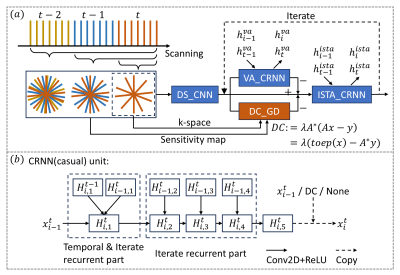 |
Computer Number: 81
2038. A
Recurrent Neural Network Based Real-Time Reconstruction Method
for MRI Navigation in Robot Assisted Intervention
S. Zhong, S. Huang, H. Chen, A. Gao, G-Z Yang, Z. Zhang
School of Biomedical Engineering, Shanghai Jiao Tong University, Shanghai, China
Impact: We propose a promising MRI reconstruction
algorithm suitable for navigation scenarios, which will help
advance our goals in MRI-guided surgeries.
|
|
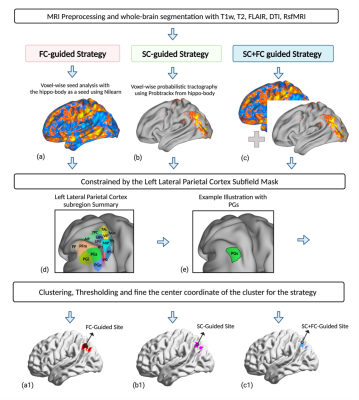 |
Computer Number: 82
2039. Optimizing
Connectivity-Guided Theta Burst Stimulation Targeting for Memory
Enhancement in Mild Cognitive Impairment
Y. Liu, M. Sundman, C. Ugonnab, A-C Chen, L. Haaheima, J.
Green, H. Siu, Y-H Chou
University of Arizona, Tucson, United States
Impact: This study demonstrates that
connectivity-informed TBS targeting enhances memory,
revealing distinct interaction effects across TBS protocols
and parietal subregions. The findings support personalized,
connectivity-based brain stimulation as a potential
therapeutic approach for memory deficits in
neurodegenerative conditions.
|
|
 |
Computer Number: 83
2040. 3D
Keypoint-Based Neural Network for Rapid Needle Localization on
Multislice 2D MRI
W. Zhou, Q. Dai, O. Curiel, D. Lu, J. Chiang, T-C Tsao, H.
Wu
University of California, Los Angeles, Los Angeles, United States
Impact: This work developed a 3D keypoint-based method
for rapid, accurate needle localization on multislice 2D
MRI, outperforming 3D UNet and matching human intra-reader
variation. The keypoint-based method could be adapted to
assist different needle-based MRI-guided interventions.
|
|
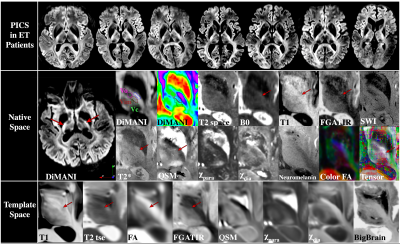 |
Computer Number: 84
2041. "PICS":
a novel patient-specific landmark for thalamic surgical
interventions in the Posterior limb of the Internal Capsule
Signal
R. Patriat, J. Chandrasekaran, K. Sretavan, H. Braun, S.
Brenny, Y. Seddighi, M. Hill, N. Harel, L. Brito de Almeida
University of Minnesota, Minneapolis, United States
Impact: A new MRI landmark is now visible on DiMANI,
enabling patient-specific direct targeting for DBS and
MR-guided focused ultrasound procedures. This will provide
immediate impact by enhancing accuracy, clinical workflow
efficiency and ultimately improve patient outcomes.
|
|
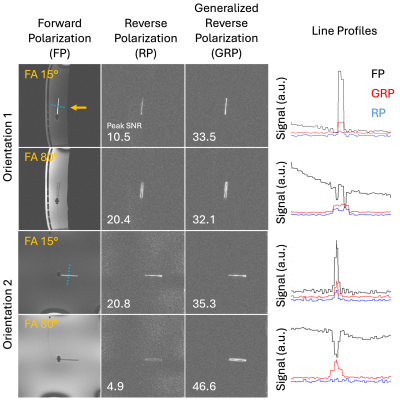 |
Computer Number: 85
2042. A
generic approach for reverse polarization device imaging.
D. K. Yildirim, R. Ramasawmy, D. Herzka, R. Lederman, A.
Campbell-Washburn, E. Atalar
National Heart, Lung and Blood Institute, National Institute of Health, Bethesda, United States
Impact: Generalized reverse polarization approach
enhances interventional device visibility across various
field strengths and MRI systems, promoting broader adoption
of interventional MRI with minimal device modifications
omitting RF-induced heating prone, long transmission lines,
ultimately facilitating safer and more efficient MRI-guided
procedures.
|
|
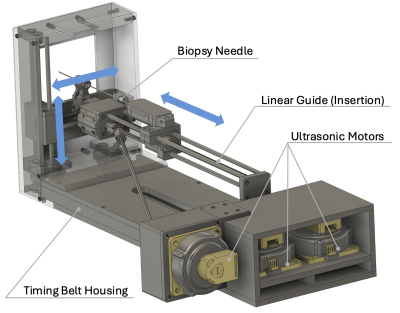 |
Computer Number: 86
2043. Open-Source
3D-Printable MRI-Conditional Needle Placement Robot for
MR-Guided Prostate Interventions
J. Tokuda, P. Moreira, M. Bernardes, L. Connolly, A. Kumar,
L. Al-Zogbi, L. Foley, K. Tuncali, C. Tempany, N. Hata, I.
Iulian, A. Krieger, A. Deguet, S. Leonard
Brigham and Women's Hospital, Boston, United States
Impact: This 3D-printed robot allows for open-source
hardware development for rapid prototyping, testing, and
resource sharing of an MRI-guided needle placement robot. It
provides a solution for open science promoted by a growing
number of organizations and government agencies worldwide.
|
|
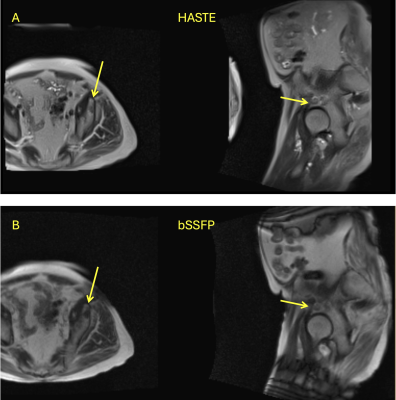 |
Computer Number: 87
2044. Real-time
Image Guidance for Bone Biopsy at 0.55T
X. Wu, P. Su, J. Pang, P. Leon, O. Darwish, M. Nickel, M.
Ohliger, M. Hoff, R. Kohlbrenner, A. Lam, T. Hope, Y. Yang
University of California San Francisco, San Francisco, United States
Impact: Real-time protocols on 0.55T MRI appear feasible
for biopsy guidance. Future interventional studies with
phantoms and human subjects can be performed.
|
|
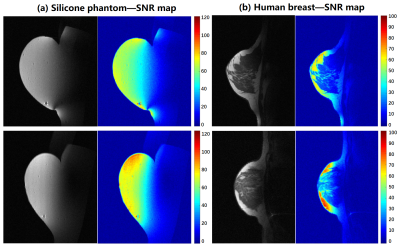 |
Computer Number: 88
2045. Development
of an Adjustable Surface Coil for Mobile Low-Field MRI-Guided
Breast Interventions
Q. Liu, Q. Zhang, X. Song, K. Yuan, L. Chen, B. Qiu
University of Science and Technology of China, Hefei, Anhui, China
Impact:
This adjustable surface coil is designed to work with the open low-field MRI system, providing high imaging SNR for real-time guidance during breast interventional surgeries and expanding access to precise medical care in remote areas through the mobile MRI platform. |
|
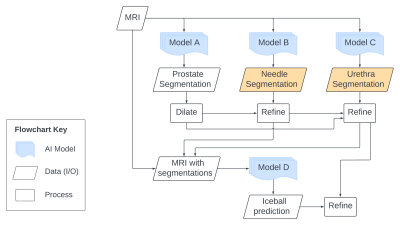 |
Computer Number: 89
2046. Leveraging
Automation for Adaptive Planning in MRI-Guided Prostate Cancer
Focal Cryoablation
N. Modugula, K. Tuncali, C. Tempany, J. Tokuda, N. Hata, P.
Moreira
Brown University, Providence, United States
Impact: Integrating automatic AI-based segmentation for
rapid iceball prediction enables adaptive, real-time
planning in cryoablation. This approach minimizes
labor-intensive segmentation, allowing updates with each
needle insertion to ensure comprehensive tumor ablation,
enhancing precision, confidence, and efficiency in prostate
cancer treatment.
|
|
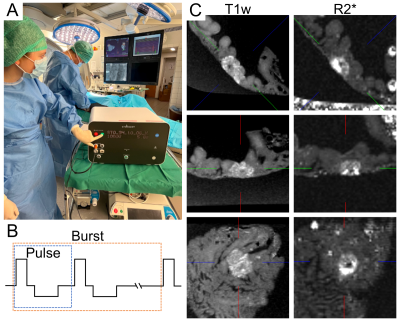 |
Computer Number: 90
2047. Towards
MR-guided Pulsed Field Ablation: Lesion Characterization with
LGE and Demonstration of an MR-compatible Interventional Setup
S. Reiss, F. Koch, F. Spreter, J. Fischer, E. Chleilat, P.
Kohl, M. Bock
University Medical Center Freiburg, University of Freiburg, Freiburg, Germany
Impact: High-resolution ex vivo MRI accurately assesses
pulsed field induced ablation lesions in a porcine model,
providing valuable insights for optimizing PFA lesion
formation to treat cardiac arrhythmia. MR-guided PFA is
demonstrated to be feasible, which could enable real-time
lesion monitoring.
|
|
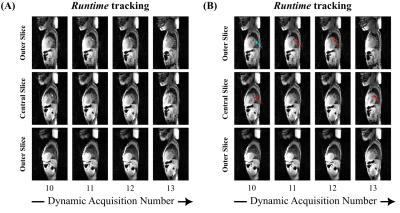 |
Computer Number: 91
2048. Prospective
AI-based Slice Tracking for Continuous MRI Visualization of
Gadolinium-Filled Cardiac Catheters
A. Neofytou, G. Kowalik, R. Vidya Shankar, K. Kunze, T.
Moon, N. Mellor, R. Neji, R. Razavi, K. Pushparajah, S.
Roujol
King's College London, London, United Kingdom
Impact: This AI-based framework could simplify
MRI-guided cardiac catheterization by reducing manual input,
potentially decreasing procedural time and enhancing
visualization accuracy, supporting broader clinical adoption
and improved patient outcomes.
|
|
 |
Computer Number: 92
2049. MR-Guided
Vagal Cryoablation for the Treatment of Obesity in a Canine
Animal Model – Preliminary Results
A. Kamireddy, C. Weiss, E. J. Shin, C. Brayton, R. Anders,
D. Kraitchman
Johns Hopkins University School of Medicine, Baltimore, United States
Impact: Preliminary results indicate MR-guided vagal
cryoablation is feasible and safe but may require adjunctive
therapies for effective obesity management. Future studies
could enhance its efficacy as part of a multimodal treatment
approach.
|
|
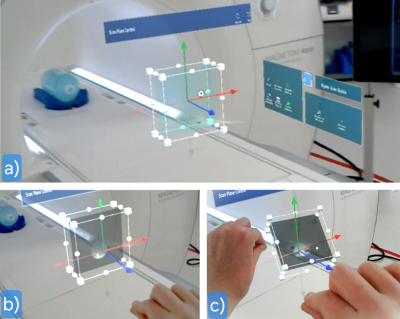 |
Computer Number: 93
2050. An
Extended Reality Interface for Interventional MRI
E. Ilia, I. Kramers, R. Damgrave, W. Brink
University of Twente, Enschede, Netherlands
Impact:
Our Extended Reality tool may improve MRI-guided interventions by allowing for in-room scan-plane control during real-time imaging and advanced image and tracking display capabilities; this could increase accuracy, streamline the workflow and help leverage the full potential of interventional MRI. |
|
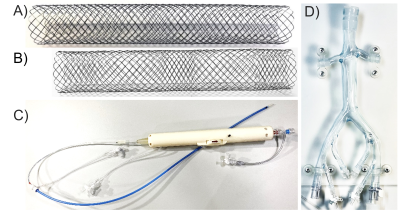 |
Computer Number: 94
2051. A
Novel MR-Safe Delivery System for MR-guided Venous Stenting:
First Measurements at 3T in an Iliac Vein Phantom
L. Regler, S. Reiss, N. Verloh, K. Düring, A. Hoffmann, P.
Virkar, W. Uller, M. Bock
Division of Medical Physics, Dept. of Diagnostic and Interventional Radiology, University Medical Center Freiburg, Faculty of Medicine, University of Freiburg, Freiburg, Germany
Impact: With the presented new MR-compatible delivery
system MR-guided venous stenting becomes technically
possible.
|
|
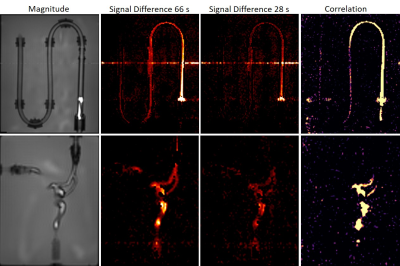 |
Computer Number: 95
2052. Feasibility
of Dynamic Intra-Arterial Spin Labeling for Highly Time Resolved
Angiography
F. Spreter, S. Reiss, J. Fischer, A. Maier, M. Bock
University Medical Center Freiburg, Freiburg im Breisgau, Germany
Impact: Dynamic iASL can visualize blood flow dynamics
similar to contrast-enhanced fluoroscopy, making it an
essential tool for MR guided catheterizations.
|
|
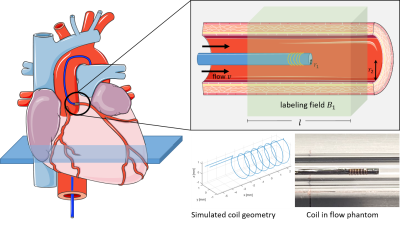 |
Computer Number: 96
2053. Towards
Robust Intra-Arterial Spin Labeling: Simulations and
Measurements of the Labeling Efficiency
F. Spreter, S. Reiss, A. Oezen, A. Maier, M. Bock
University Medical Center Freiburg, Freiburg im Breisgau, Germany
Impact: Robust and efficient intra-arterial spin
labeling can be achieved for perfusion measurements during
MR-guided interventions.
|
The International Society for Magnetic Resonance in Medicine is accredited by the Accreditation Council for Continuing Medical Education to provide continuing medical education for physicians.